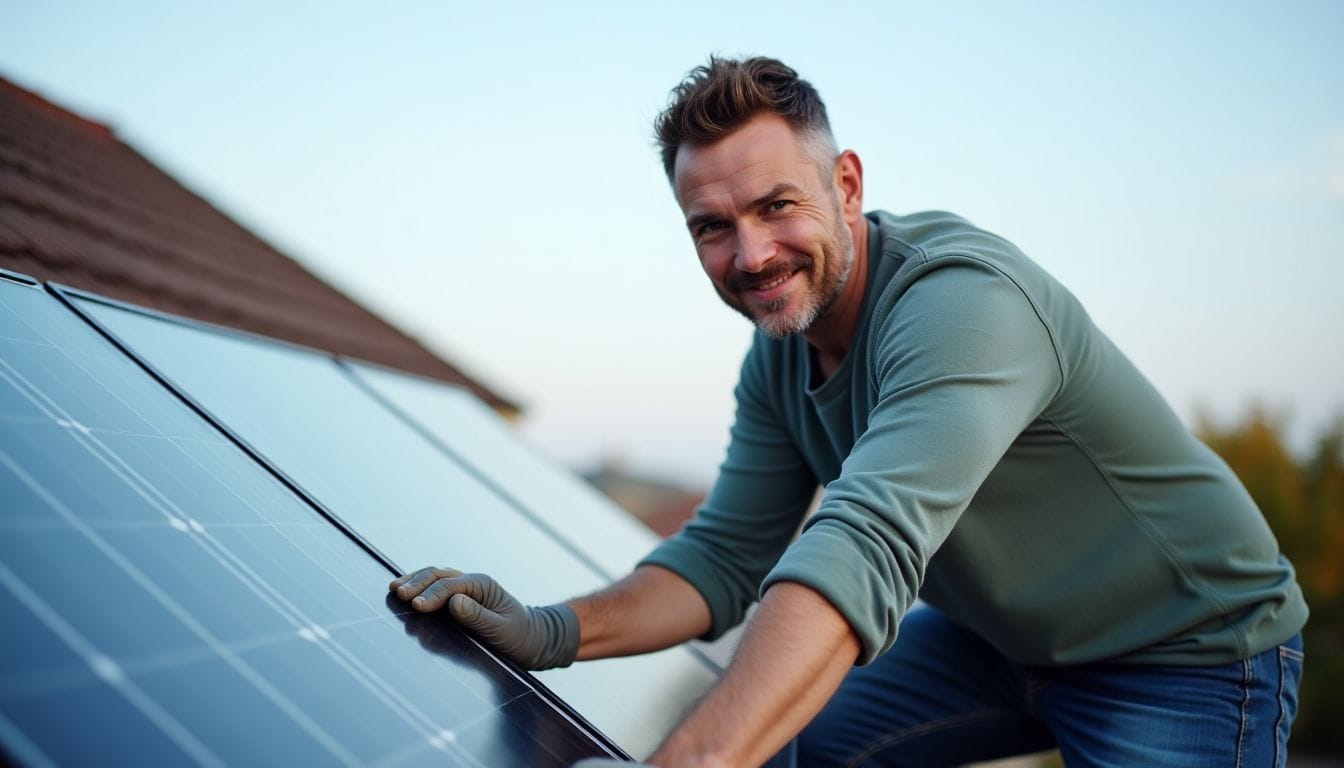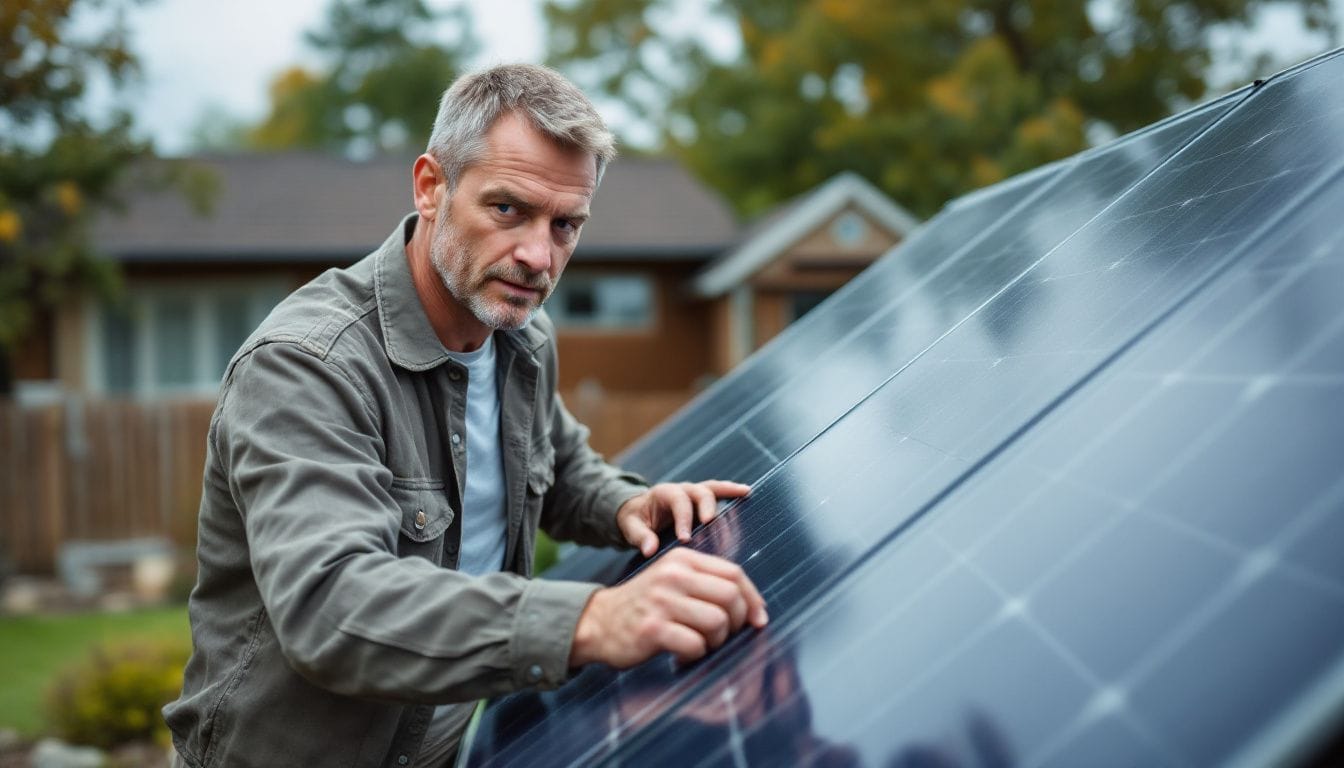When Do Solar Panels Start Working On A Cloudy Day?
Many people worry about solar panels on cloudy days. They ask, “When do solar panels start working?” This question is common, especially in areas with less sun.
Solar panels can work even when it’s cloudy. They start making power as soon as light hits them. This happens very early in the day. Our article will show you how solar panels work in all types of weather.
You’ll learn why clouds don’t stop your panels from making power.
Solar energy is still useful on grey days. Read on to find out how.
Key Takeaways
- Solar panels start working as soon as light hits them, even on cloudy days.
- They can produce 10-25% of their normal power output on overcast days.
- Panels use ambient light, not just direct sunlight, to generate electricity.
- In the UK, solar panels can start working as early as 4 am in summer.
- Winter reduces solar panel output by half due to shorter days and less sunlight.

How Do Solar Panels Work?
Solar panels turn sunlight into power. They use special cells that react when light hits them.
Conversion of sunlight into electricity
Photovoltaic cells in solar panels turn sunlight into power. These cells contain silicon layers that react when hit by light. This reaction creates an electric field, pushing electrons to flow.
The result? Direct current (DC) electricity.
But homes use alternating current (AC). So, an inverter steps in to change DC to AC. This process happens fast – panels start making power within seconds of sun exposure. Even on cloudy days, they work.
They can produce 10-25% of their normal output, based on cloud thickness.
Heat affects how well panels work too. When it’s over 25°C, they become less efficient. That’s why cool, sunny days are best for solar power. At night, panels stop working and enter ‘sleep mode’.
But don’t worry – any extra power made during the day can be sold back to energy firms.
Role of photovoltaic cells
Photovoltaic cells are the heart of solar panels. These tiny devices turn sunlight into electricity. They’re made mostly of silicon, a material that reacts to light.
When sunlight hits a PV cell, it excites electrons inside. These energised electrons create an electric current. This process happens without moving parts or making noise. The cells work best in cool weather, which boosts their efficiency.
PV cells produce direct current (DC) electricity. This DC power then goes through an inverter. The inverter changes it to alternating current (AC) for home use. Solar panels with many PV cells can power homes and businesses.
Do Solar Panels Work on Cloudy Days?
Solar panels can work on cloudy days, but they’re less efficient. They still catch some light, even when it’s not sunny.
Reduced efficiency during cloud cover
Clouds affect how well solar panels work. On cloudy days, panels make less power than on sunny days. Light clouds cut power by about 24%. Heavy clouds drop it by 67%. Rain can slash output by up to 90%.
But panels still work, even with clouds. They use any light that gets through. This means your home can still get some solar energy on grey days.
Panels start making power as soon as light hits them. Even on cloudy mornings, they begin working. The amount of power depends on how thick the clouds are. Thinner clouds let more light pass.
This helps panels make more electricity. Thicker clouds block more light, so panels make less power. But they never stop completely unless it’s very dark.
Ambient light and electricity generation
Solar panels work even on cloudy days. They use ambient light to make power. This light comes from all around, not just direct sun. On overcast days, panels still catch about 10-25% of their normal output.
Diffuse light helps solar cells work. It bounces off clouds and objects before hitting panels. A 350W panel can make 0.55 kWh on a cloudy day. This drops to 0.24 kWh when it’s very dark.
The ‘Edge of Cloud’ effect can boost power for short times. This happens when sunlight reflects off cloud edges onto panels.
When Do Solar Panels Start Working on Cloudy Days?
Solar panels start working as soon as there’s light, even on cloudy days. They can produce power from dawn, though at lower levels than on sunny days.
Early morning and ambient light thresholds
Panels begin working at dawn, even on cloudy days. They need just a bit of light to start making power. In the UK, this can be as early as 4 am in summer. The exact time changes with seasons and weather.
Ambient light is enough to get panels going. They don’t need direct sun to work. Even on very grey days, panels can make some electricity. But they make less than on bright days. The key is having enough light to activate the cells.
Impact of winter and shorter daylight hours
Winter brings shorter days and less sunlight. This cuts solar panel power by half. Panels still work, but make less energy. In the UK, winter panels need a 60° angle to catch more sun.
Cloudy days lower output by 24%. Even so, panels can make 10-25% of their usual power on grey days. Smart tech helps panels work better in winter. It’s key to place panels where they get the most light all year.
Conclusion
Solar panels start working at dawn, even on cloudy days. They use ambient light to make power, not just direct sun. Panels can produce up to 25% of their normal output in overcast conditions.
Modern solar tech works well in various weather, including rain and snow. Batteries store extra energy for use when sunlight is low. Clean your panels often to keep them working their best.
FAQs
1. Do solar panels work on cloudy days?
Yes, solar panels still work when it’s cloudy. They convert sunlight into power, even on grey days. But they make less power than on sunny days.
2. What time do solar panels start working?
Solar panels begin to work at sunrise. They keep making power all day, until sunset. The most power comes at noon when the sun is highest.
3. How much power do solar panels make on cloudy days?
On cloudy days, solar panels make about 10-25% of their normal power. This varies based on how thick the clouds are and the panel type.
4. Can I still use solar energy at night?
Solar panels don’t work at night. But you can use stored power from solar batteries. Or, you can use power from the grid if you’re connected.
5. Do solar panels work well in winter?
Yes, solar panels work in winter. Cold weather can even help them work better. But shorter days and snow can lower their output.
6. How can I boost my solar panel output on cloudy days?
To get more power on cloudy days, you can:
- Add more panels
- Use high-quality panels
- Keep panels clean
- Use a solar tracker
- Install a solar inverter
These steps can help increase your solar energy production.

